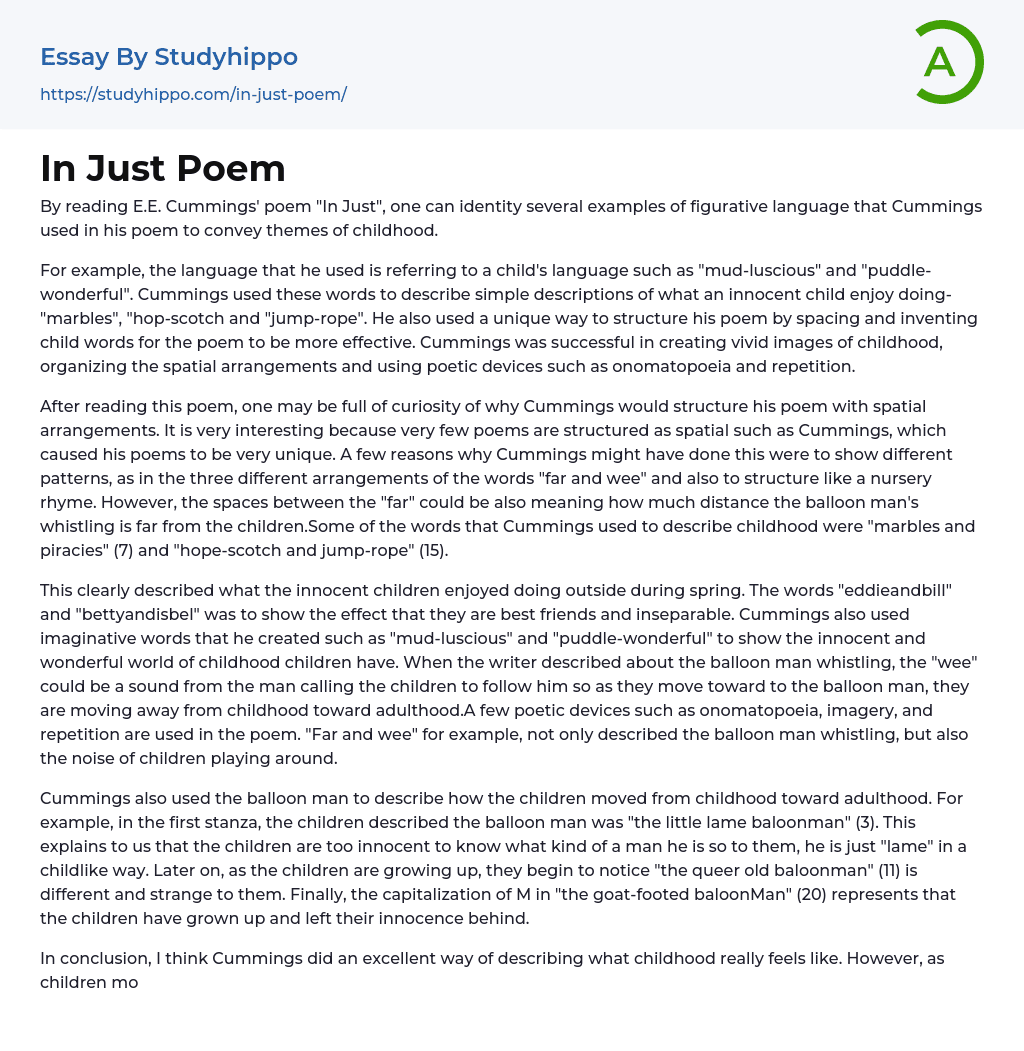By reading E.E. Cummings' poem "In Just", one can identity several examples of figurative language that Cummings used in his poem to convey themes of childhood.
For example, the language that he used is referring to a child's language such as "mud-luscious" and "puddle-wonderful". Cummings used these words to describe simple descriptions of what an innocent child enjoy doing- "marbles", "hop-scotch and "jump-rope". He also used a unique way to structure his poem by spacing and inventing child words for the poem to be more effective. Cummings was successful in creating vivid images of childhood, organizing the spatial arrangements and using poetic devices such as onomatopoeia and repetition.
After reading this poem, one may be full of curiosity of why Cummings would structure his poem with spatial arrangements. It is very interesting because very few poems
...are structured as spatial such as Cummings, which caused his poems to be very unique. A few reasons why Cummings might have done this were to show different patterns, as in the three different arrangements of the words "far and wee" and also to structure like a nursery rhyme. However, the spaces between the "far" could be also meaning how much distance the balloon man's whistling is far from the children.Some of the words that Cummings used to describe childhood were "marbles and piracies" (7) and "hope-scotch and jump-rope" (15).
This clearly described what the innocent children enjoyed doing outside during spring. The words "eddieandbill" and "bettyandisbel" was to show the effect that they are best friends and inseparable. Cummings also used imaginative words that he created such as "mud-luscious" and "puddle-wonderful" to show the innocent and wonderful world o
childhood children have. When the writer described about the balloon man whistling, the "wee" could be a sound from the man calling the children to follow him so as they move toward to the balloon man, they are moving away from childhood toward adulthood.A few poetic devices such as onomatopoeia, imagery, and repetition are used in the poem. "Far and wee" for example, not only described the balloon man whistling, but also the noise of children playing around.
Cummings also used the balloon man to describe how the children moved from childhood toward adulthood. For example, in the first stanza, the children described the balloon man was "the little lame baloonman" (3). This explains to us that the children are too innocent to know what kind of a man he is so to them, he is just "lame" in a childlike way. Later on, as the children are growing up, they begin to notice "the queer old baloonman" (11) is different and strange to them. Finally, the capitalization of M in "the goat-footed baloonMan" (20) represents that the children have grown up and left their innocence behind.
In conclusion, I think Cummings did an excellent way of describing what childhood really feels like. However, as children move on towards adulthood, they will also become more mature and grow to embrace adult perspective, which may lead them to have nasty thoughts in their mind. This is what happens to many children, and I think Cummings wrote this poem to let children know what the real world is like; "innocent" and "puddle-wonderful" will be left behind as we begin to step into adulthood.
- Boo Radley essays
- Genesis essays
- Richard iii essays
- Alice in Wonderland essays
- On the road essays
- Ozymandias essays
- The Nightingale essays
- Holden Caulfield essays
- Animal Farm essays
- 1984 essays
- A Hanging essays
- Shooting An Elephant essays
- A Tale Of Two Cities essays
- Adventures Of Huckleberry Finn essays
- Arthur Conan Doyle essays
- Brave New World essays
- Characters In Hamlet essays
- Characters In Romeo And Juliet essays
- Desdemona essays
- Diary Of A Wimpy Kid essays
- First-Person Narrative essays
- Frankenstein essays
- Heart Of Darkness essays
- Jane Eyre essays
- Jay Gatsby essays
- King Duncan essays
- Librarian essays
- Little Red Riding Hood essays
- Lord Of The Flies essays
- Silas Marner essays
- The Cask Of Amontillado essays
- The Catcher In The Rye essays
- The Crucible essays
- The Handmaid's Tale essays
- The Reader essays
- Virgil essays
- Wuthering Heights essays
- Candide essays
- Castle essays
- J. D. Salinger essays
- Ulysses essays
- Ethan Frome essays
- In Cold Blood essays
- Outliers essays
- Tuesdays With Morrie essays
- The Art of War essays
- Wife of Bath essays
- Huckleberry Finn essays
- The Lady With The Dog essays
- Great Expectations essays




